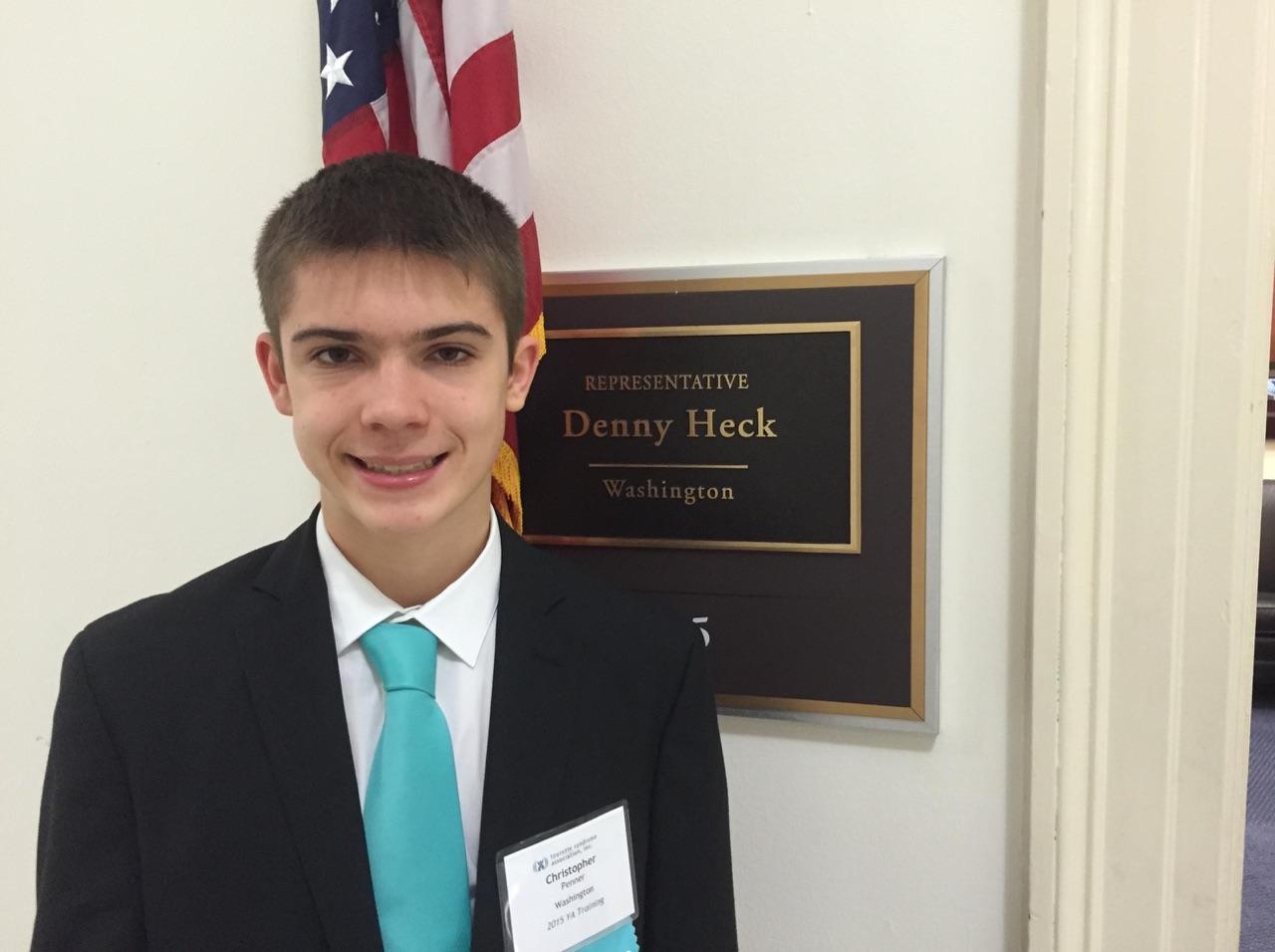By Amy Rowley
![]() The urge to sneeze is overwhelming. I stand frozen, elbow bent, ready to catch my germs in the crook of my arm. When I explain that my seasonal allergies have flared up, people nod understandably.
The urge to sneeze is overwhelming. I stand frozen, elbow bent, ready to catch my germs in the crook of my arm. When I explain that my seasonal allergies have flared up, people nod understandably.
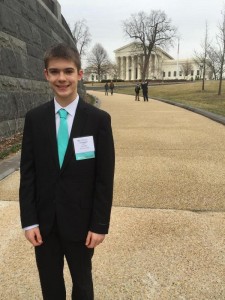
Imagine that sensation overcoming you thousands of times a day. “You can stop blinking or hold back a sneeze for a bit, but eventually it has to come out,” explains Erik Penner. “That’s how I describe the urge of Tourette’s syndrome tics.”
Erik’s son, Chris, was diagnosed with Tourette’s syndrome when he was 5-years-old. Now 14, Chris is serving as a Youth Ambassador, elected by the Washington State Tourette Syndrome Association. Along with about 50 other youths, Chris and Erik recently spent a few days in Washington DC, training for the role. Chris then spoke with federal legislative staffers to advocate for research funding and promoting awareness of Tourette’s syndrome.
For Chris, Tourette’s syndrome came on suddenly when he was 4-years-old. “Chris’ onset was so severe. He couldn’t sit in my lap and was having 5,000 – 6,000 tics a day. In just two days time, he went from being a well-behaved preschooler to a child who I wasn’t sure would fit into public education,” explains Chris’ mom, Kathleen.
As parents, Erik and Kathleen were baffled. Erik is an emergency room physician at Providence St. Peter Hospital and Kathleen has her Masters in Education — two careers that should have prepared them for recognizing the symptoms of Tourette’s syndrome. But, neither knew what was happening to their son.
“As a parent, it’s so frustrating. You want to just say ‘stop and sit still.’ You figure that your child should be able to control these tics,” explains Kathleen when they had ruled out seizures. “Now I know that if I ignore Chris’ tics and work to create a calm environment that it’s better for him.”
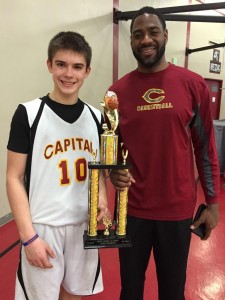
Little is known about Tourette‘s syndrome and why the brain sends the messages to flick your hand, blink your eye repetitively, or make socially inappropriate verbal sounds. Tics are different for each person and fluctuate in intensity. “I know that stress and illness can make my tics stronger,” explains Chris. For most kids, tics peak in the pre-puberty years. Periods of growth or not eating properly also impact tics. For some people, tics become markedly less intense or even go away entirely in adulthood.
But, by then many people have succumbed to other “side effects” of Tourette’s syndrome. Erik explains that it’s not uncommon for children to do poorly in school and experience depression and anxiety as a result of their tics.
Take this quick test that Chris and Erik walked me through. The average adult can write the Pledge of Allegiance in 90 seconds. Grab a pen, paper and a partner and set your timer. Now, on every third word, cross it out and rewrite it. Then, every time your partner claps, touch your finger to the table. The clapping should become more frequent during the 90 seconds simulating the effects of stress. Then, your partner starts adding in comments like “come on, this is easy” or “you have plenty of time to finish this task.” I believe I made it to about the third phrase of the pledge.
Now imagine if you add in an eye tic that causes you to lose your place while reading every three seconds. Or perhaps you have a vocal tic where your body emits a sound repetitively. You now have a view, albeit a simplistic one, into the effects of Tourette’s syndrome on school children.
“With awareness comes acceptance,” explains Erik. “This is a medical condition and kids can have accommodations such as prolonged test taking or permission to step out of the classroom briefly, as just a few examples.” Part of Chris’ role is to share how educators can assist Tourette’s syndrome kids and create environments that are more conducive to learning.
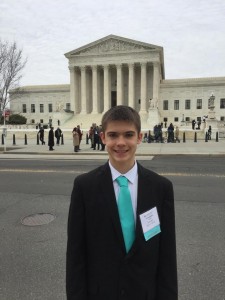
In 5th grade, Chris was going through a growth spurt. He put into practice some habit reversal therapies to try to temporarily ask his brain to control the tics. His parents remember talking with his Griffin School teacher, Tammy Phillips. “She told us that he was trying so hard to control the tics by grabbing the desk that it was shaking,” says Kathleen.
“I’m able to concentrate when I do math,” says Chris. To calm Chris, Mrs. Philips would “write” math problems on his back for him to solve. Chris’ tics surprisingly halt when he works through a complicated three-digit multiplication problem. “When there is focused thinking, something happens in the brain that bypasses the urge to tic,” explains Erik. “We don’t know enough about how those chemicals are working to fully understand it.”
Now an 8th grader, Chris is a 4.0 student who excels in the classroom. His experience meeting other Youth Ambassadors, though, has shown him that this isn’t always the case for kids with Tourette’s syndrome. Many kids didn’t grow up in a small, supportive community. Besides their tics, they are coping with self-esteem issues that may become more debilitating than tics as adults.
Chris’ approach to his tics is remarkably different. “I’m totally fine and it really doesn’t bother me. It’s what I have,” he says quietly but confidently.
The Penner family applauds the Griffin School administrator, teachers and community for accepting Chris. “Kids are such advocates for Chris,” shares Kathleen when describing a time in 5th grade when the kids backed up Chris to a substitute teacher.
“Kids are so accepting,” adds Erik. “Tourette’s syndrome is a medical condition, like asthma. Everything else with Chris and other kids is normal.” This is the message that Chris Penner will be delivering to the community during his year as Youth Ambassador.
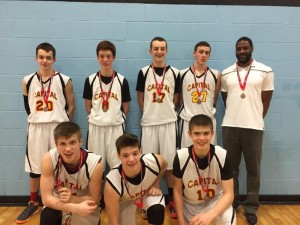
“The first time I met Chris was in 4th grade. He was making some noise and twitching and I asked him if he was OK. Then his dad explained about Tourette’s syndrome,” describes basketball teammate Taylor Mastin. “I really don’t even notice it anymore.”
Chris’ buddy Brady Hale agrees. “I really don’t even think about any of it. We’re just playing basketball.”
Chris would rather be defined by his play on the basketball court, his academic accomplishments and his empathetic behavior toward other people. Advocating for Tourette’s syndrome, however, is the path that his parents have encouraged him to walk down.
“Tourette’s syndrome won’t stop Chris. As parents, we are encouraging Chris to be a Youth Ambassador for Tourette’s syndrome because we feel that since he is doing so well that he has an obligation to help others. I want other kids to learn from Chris that Tourette’s syndrome doesn’t have to be a block. Instead, it can catapult you to other places in your life,” concludes Kathleen.
“Chris is learning how to advocate for himself. With that skill comes the ability to advocate for others,” adds Erik.
The next time you hear about Chris Penner, it will likely not be related to Tourette’s syndrome. Instead, you may read a sports article about the athletic superstar or maybe you will read a medical journal article with his byline. For you see, Chris Penner hopes to become a neurologist or Tourette’s syndrome specialist and take this advocacy role even further as an adult.
To learn more about Tourette’s syndrome, visit www.tsa-usa.org. If you have specific questions, reach out to Todd Henry, chair of the Washington/Oregon chapter of the Tourette Syndrome Association at 206-621-2108 or tsawashingtonchapter@yahoo.com.









































